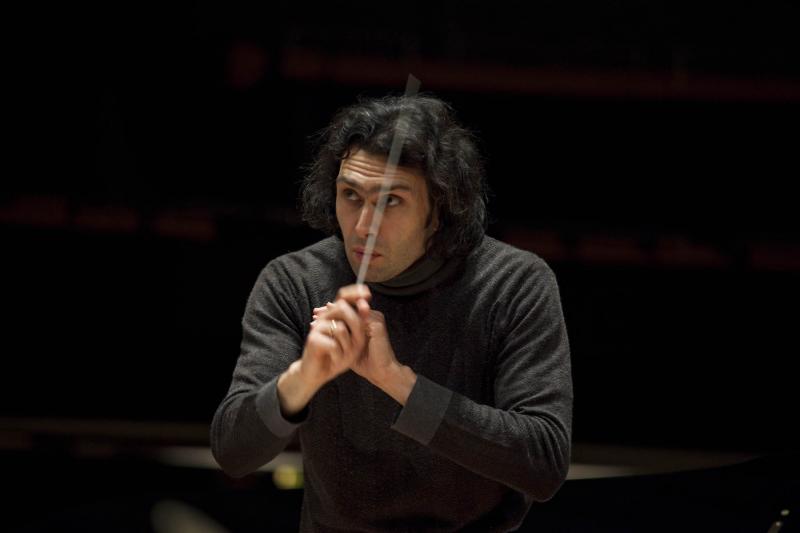London Philharmonic Orchestra, Jurowski, Royal Festival Hall | reviews, news & interviews
London Philharmonic Orchestra, Jurowski, Royal Festival Hall
London Philharmonic Orchestra, Jurowski, Royal Festival Hall
The LPO's principal conductor in effortless control of juicy operatic decadence

Dissatisfied housewives who eventually stand by their men joined jewelled hands in a divine evening of operatic decadence. Suppressed Bianca all but steps over the body of her strangled lover to get at the muscles of her killer husband in Zemlinsky’s A Florentine Tragedy, taking its cue from the deep purple imagery of Oscar Wilde’s story.
Neither work has been without its drawbacks in my opera-house experience. Zemlinsky’s 1917 one-acter paled alongside his masterpiece, The Birthday of the Infanta, in a 1980s Royal Opera double bill. And Strauss’s massive fairy tale about two very different married couples drawing closer over fertility issues loses quite a bit of steam in its third act, where it seems the composer had to wait too long for the libretto from his "house poet" Hugo von Hofmannsthal and lost interest. You can sidestep the problem if, like Jurowski, you piece together a 50-minute symphonic picture, but others potentially take its place. Will the bleeding chunks join to form a slimmer operatic body? Can the passages without vocal infill stand alone?
In the end it turned out to be an absorbing exercise in orchestral colour, and not just in getting to see where such exotic (and expensive) extras as the four tenor tubas, two celestas, glass harmonica and assorted exotic percussion fit into the panavision fabric. In concentrating on the supernatural rather than human aspects of the drama, Jurowski balanced impressionistic reverie with impeccable poise and shone a weird light less on Mr and Mrs Barak than on the airier-fairier Emperor and Empress. Though their Act Two crises stopped short of each crux, there was leisure to examine the Empress’s ultimate challenge in deciding whether or not to take the mortal woman’s shadow, shorn of its spoken melodrama but uncut in its lurid, polytonal nightmare as it rarely is in the opera house.
 Jurowski imposed admirable restraint on the shimmering and twittering of Strauss's fertile happy end; here at least no one in the audience would have needed supertitle directions (elsewhere, signposts like "the voices of unborn children sing from the frying pan" might have been helpful). Poised solos from cellist Kristina Blaumane and leader Pieter Schoeman had space to caress, and Paul Benniston’s exquisite handling of the high-lying first trumpet part stood as a subtle emblem of this immaculate interpretation.
Jurowski imposed admirable restraint on the shimmering and twittering of Strauss's fertile happy end; here at least no one in the audience would have needed supertitle directions (elsewhere, signposts like "the voices of unborn children sing from the frying pan" might have been helpful). Poised solos from cellist Kristina Blaumane and leader Pieter Schoeman had space to caress, and Paul Benniston’s exquisite handling of the high-lying first trumpet part stood as a subtle emblem of this immaculate interpretation.
After the interval, Zemlinsky’s short, sensual shocker resumed the orchestral ferment with mostly less memorable material than Strauss’s, but plenty of dramatic light and shade effortlessly manoeuvred by Jurowski. Instrumental illustration of the overripe Wildean imagery – flutes fluttertonguing as a flight of moths, lower instruments stalking protagonist Simone’s prison-house soul – kept the textures lively. Riding the orchestra’s superabundance of opulent silks were Heike Wessels (pictured above right) - a voluptuous mezzo of whom we wanted to hear more, and certainly will in future – Sergei Skorokhodov as the clarion aristocrat lover who tries to buy her from the husband he disdains and Albert Dohmen as the lugubrious merchant with death on his mind.
It’s Simone’s show, and Dohmen, a great Wotan and Barak, never had to force his malleable bass-baritone, though it must have been tempting with the LPO seething unrestrained around him. What a pleasure to hear such relaxed engagement of a top-notch voice, and how suavely Jurowski’s magnificent orchestra reflected back Dohmen's ease of delivery on its way to the sado-masochistic denouement.
- Listen to this concert for the next seven days on the BBC Radio 3 iPlayer
- Jurowski's next LPO concert is a Russian bell themed programme on Saturday 29 September
rating
Share this article
Add comment
The future of Arts Journalism
You can stop theartsdesk.com closing!
We urgently need financing to survive. Our fundraising drive has thus far raised £49,000 but we need to reach £100,000 or we will be forced to close. Please contribute here: https://gofund.me/c3f6033d
And if you can forward this information to anyone who might assist, we’d be grateful.

Subscribe to theartsdesk.com
Thank you for continuing to read our work on theartsdesk.com. For unlimited access to every article in its entirety, including our archive of more than 15,000 pieces, we're asking for £5 per month or £40 per year. We feel it's a very good deal, and hope you do too.
To take a subscription now simply click here.
And if you're looking for that extra gift for a friend or family member, why not treat them to a theartsdesk.com gift subscription?

Comments
Truly daring programming,
Jurowski hasn't conducted